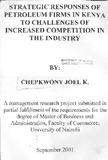| dc.description.abstract | Liberalization of the Kenyan economy and particularly the petroleum sector in 1994 has
witnessed unprecedented competition in this once lucrative petroleum industry.
The study set out to document the strategic responses of the oil firms in Kenya to challenges of
increased competition. To achieve this, the objective of the study was: -
To determine the measures taken to respond to challenges of increased competition.
Primary data was collected using open-ended and closed-ended questionnaires from a census of
9 firms. The data was thereafter analysed using tables, mean scores, and percentages.
The analysis revealed that firms have made changes in their missions and their technologies and
that there have been considerable attempts to diversify from the markets originally served.
Firms' philosophies are now those aimed at achieving maximum customer satisfaction.
It was also established that firms have changed their ranking of goals. Survival as a goal is more
important now as opposed to the pre liberalization era when profitability was seen as the
ultimate.
In the area of planning, firms have now embraced participatory planning and that plan reviews is
more frequent now. This is because of the constant changes in the business environment and the
need to adjust accordingly.
Petroleum firms have also made adjustments in most of their strategic variables. Those variables
that have been adjusted substantially are product strategies in which most firms have taken
product quality as a top priority and seek to eliminate product contamination. They have also
continuously introduced new products to meet the ever-changing customer needs. In promotion
strategies, advertising expenditure has increased considerably with the use of various advertising
media. In research and development, the firms have increased information gathering on
competitors and customers needs with a view to maximising customer satisfaction. In cost
structure there has been substantial move to cut down on costs through such measures as
retrenchment. In social responsibility, there has been a move by most firms to be more caring to
the local communities through such things as donations to the needy like children homes etc. In
line with this is the fact that such issues as health, environment and safety are taken seriously.
Other strategies such as pricing and distribution have also been enhanced. | en |

